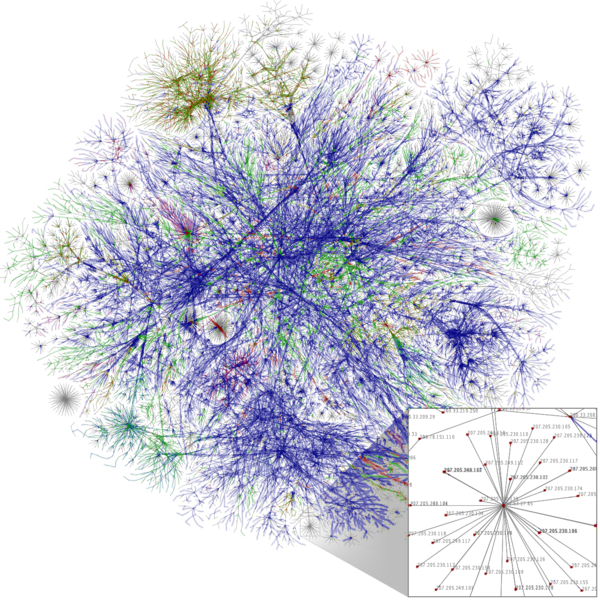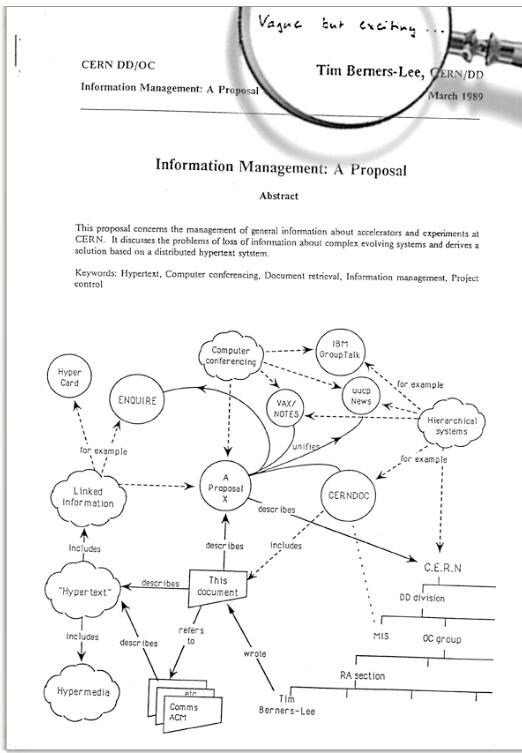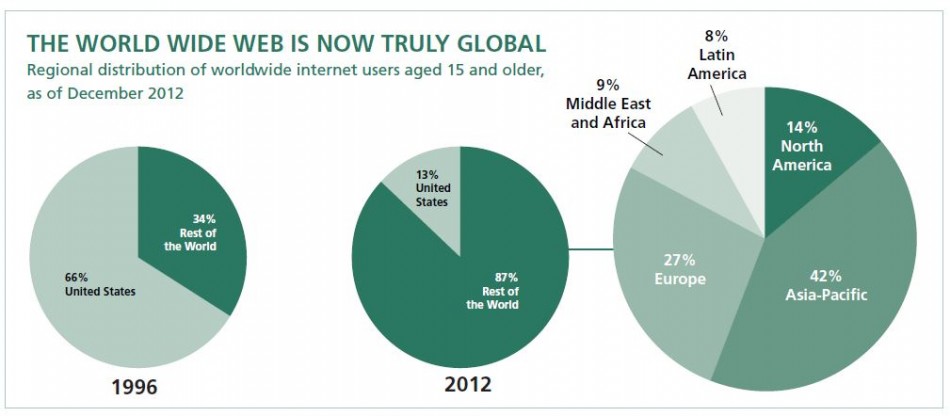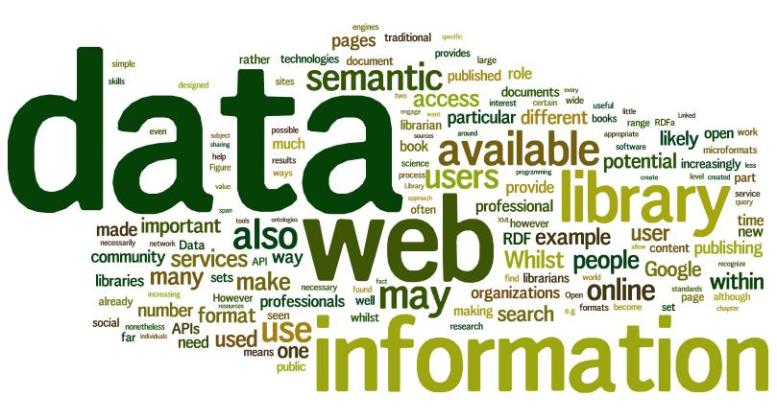World Wide Web: Difference between revisions
Siterunner (talk | contribs) |
Siterunner (talk | contribs) No edit summary |
||
| Line 4: | Line 4: | ||
<big><big>'''World Wide Web'''</big></big> | <big><big><big>'''World Wide Web'''</big></big></big> | ||
* http://en.wikipedia.org/wiki/World_Wide_Web | |||
:: [[File:Beginning of WWW 89 TimBerners-Lee CERN.jpg]] | |||
[http://www.greenpolicy360.net/w/File:Beginning_of_WWW_89_TimBerners-Lee_CERN.jpg '''WWW Origins-Foundation'''], est. by World Wide Web founder Tim Berners-Lee, "devoted to all people having access to the Web" | |||
: [http://WebFoundation.org '''WebFoundation.org'''] -- "The Web Belongs to All of Us" | |||
: <big>'''[[Online Privacy]]'''</big> | |||
: [[ | :: <big>'''[[Digital Rights]]'''</big> | ||
| Line 38: | Line 48: | ||
'''1962: "If a computer is capable of logic, then this clearly opens up the most exciting avenues"''' | |||
Raymond Baxter witnessed the extraordinary power of a computer, in Machines Like Men | Raymond Baxter witnessed the extraordinary power of a computer, in Machines Like Men | ||
| Line 47: | Line 57: | ||
Six years later: July 1968 | '''Six years later: July 1968''' | ||
The Mother of All Demos, presented by Douglas Engelbart (Stanford / Menlo Park, Calif) | The Mother of All Demos, presented by Douglas Engelbart (Stanford / Menlo Park, Calif) | ||
| Line 64: | Line 74: | ||
https://www.youtube.com/watch?v=yJDv-zdhzMY | * https://www.youtube.com/watch?v=yJDv-zdhzMY | ||
| Line 91: | Line 101: | ||
[[File:Wordcloud.jpg]] | [[File:Wordcloud.jpg]] | ||
| Line 109: | Line 108: | ||
[[Category:About Us]] | [[Category:About Us]] | ||
[[Category:Ecology Studies]] | |||
[[Category:Digital Citizen]] | [[Category:Digital Citizen]] | ||
[[Category:Digital Rights]] | [[Category:Digital Rights]] | ||
[[Category:EOS eco Operating System]] | [[Category:EOS eco Operating System]] | ||
[[Category:Economic Development]] | [[Category:Economic Development]] | ||
[[Category:Education]] | |||
[[Category:Green Marketing]] | [[Category:Green Marketing]] | ||
[[Category:Internet]] | [[Category:Internet]] | ||
[[Category:IOT]] | [[Category:IOT]] | ||
[[Category:Media]] | |||
[[Category:Mobile]] | [[Category:Mobile]] | ||
[[Category:Mobile Internet]] | [[Category:Mobile Internet]] | ||
| Line 122: | Line 124: | ||
[[Category:Netizen]] | [[Category:Netizen]] | ||
[[Category:Networking]] | [[Category:Networking]] | ||
[[Category:Online Education]] | |||
[[Category:Online Privacy]] | [[Category:Online Privacy]] | ||
[[Category:Open Access]] | [[Category:Open Access]] | ||
[[Category:Privacy Rights]] | [[Category:Privacy Rights]] | ||
[[Category:World Wide Web]] | [[Category:World Wide Web]] | ||
Revision as of 17:25, 16 January 2022
World Wide Web
WWW Origins-Foundation, est. by World Wide Web founder Tim Berners-Lee, "devoted to all people having access to the Web"
- WebFoundation.org -- "The Web Belongs to All of Us"
The Worldwide Web, Connecting Planet Earth
- Worldwide Web Consortium - http://www.w3.org/
- WWW Origins-Foundation, est. by World Wide Web founder Tim Berners-Lee, "devoted to all people having access to the Web"
- WebFoundation.org -- "The Web Belongs to All of Us"
History and Legacy of 'the Web'
Human-computer interaction: electromechanical devices; word processing; hypertext; hypermedia (e-books); the Internet (Arpanet); digital video; databanks..."
1962: "If a computer is capable of logic, then this clearly opens up the most exciting avenues"
Raymond Baxter witnessed the extraordinary power of a computer, in Machines Like Men
@BBCArchive
https://www.youtube.com/watch?v=xlUnSblYdlc
Six years later: July 1968
The Mother of All Demos, presented by Douglas Engelbart (Stanford / Menlo Park, Calif)
"The Mother of All Demos is a name given retrospectively to Douglas Engelbart's December 9, 1968, demonstration of experimental computer technologies that are now commonplace. The live demonstration featured the introduction of the computer mouse, video conferencing, teleconferencing, hypertext, word processing, hypermedia, object addressing and dynamic file linking, bootstrapping, and a collaborative real-time editor."
Some highlights:
5:00 - input: keyboard, mouse, extra-keyboard
31:30 - mouse
15:45 - todo list associated with a map
1:16:57 - hangouts + collaboratively editing of docs
@OldVideoPro
2017
A 16mm film of this demo was sent to the UK. At the time I was a lowly AV Technician at University College London. I ran the film in the New Chemistry Theatre for all the staff of the University of London Computer Centre and other interested parties. I watched fascinated. However, after 90 minutes, when it ended and the audience of senior London computing academics filed out, I heard several make comments such as "Interesting, but it will never catch on" and "What a waste of time." They had just seen the first ever Mouse, Hypertext, WP, video conferencing, and the Internet (Arpanet). I BELIEVED Doug Engelbart - they didn't! Here we are. years later, after the Xerox Star, Apple's Lisa and Mac and finally Windows. Amazing. As another commenter says, Doug should be as well known as Einstein - and FAR better than Steve Jobs or Bill Gates!
○
Looking back, years before, in another era there was Memex -- "As We May Think" --1945 / 1959 Memex II
The concept of the memex influenced the development of early hypertext systems, eventually leading to the creation of the World Wide Web, and personal knowledge base software.
In "As We May Think", Vannevar Bush describes a memex as an electromechanical device enabling individuals to develop and read a large self-contained research library, create and follow associative trails of links and personal annotations, and recall these trails at any time to share them with other researchers. This device would closely mimic the associative processes of the human mind, but it would be gifted with permanent recollection...
The pioneer of human–computer interaction Douglas Engelbart was inspired by Bush's proposal for a co-evolution between humans and machines. In a 1999 publication, Engelbart recollects that reading "As We May Think" in 1945 infected him with the idea of building a mechanism that could navigate and extend the pool of human knowledge. Around 1961, Engelbart re-read Bush's article, and from 1962 onward Engelbart developed a series of technical designs. Engelbart updated the Memex microfilm storage desk and thereby arrived at a pioneering vision for a personal computer connected to an electronic visual display and a mouse pointing device. In 1962, Engelbart sent Bush a draft article for comment, Bush never replied. The article was published in 1963 under the title "A Conceptual Framework for the Augmentation of Man's Intellect".
○



